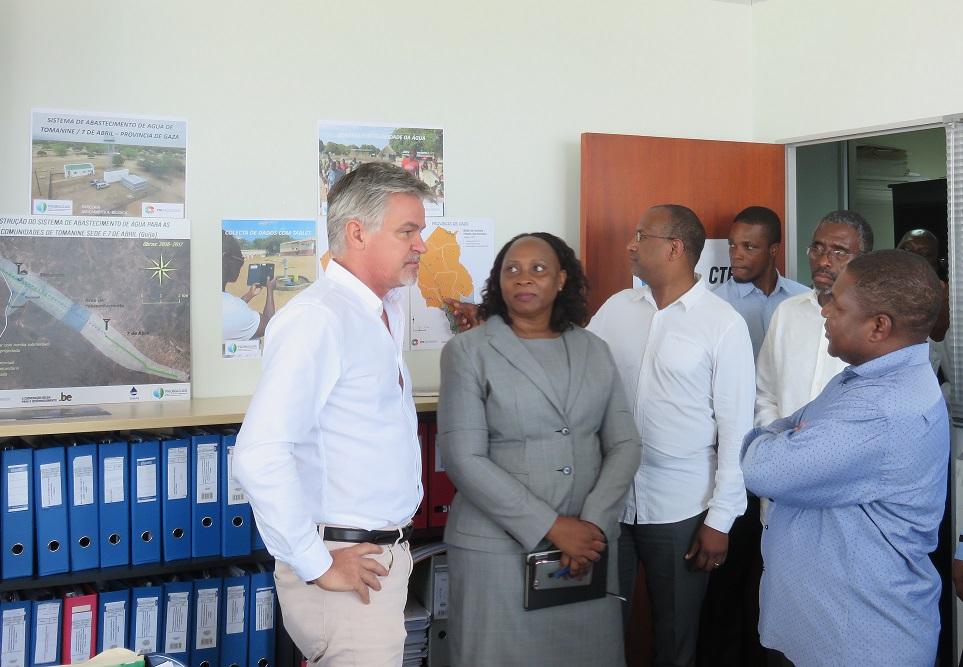BTC Mozambique leading the way in water development in rural areas
Since October 2013, BTC’s
Water Supply Gaza project has been successfully improving access to drinkable
water in rural areas of the Gaza Province, Mozambique. This relatively dry
region is characterized by remote and widely dispersed communities, that rely
on few and often salty water sources. Despite these challenges, the project has
installed and updated many water and sanitation facilities in the region,
improving the lives of over 15.000 local residents and their livestock. For
2017-2018, the project aims to reach another 40.000.
Thanks to its expertise in
this field, BTC is considered one of the leading organisations active in water
development in Mozambique. In this light, BTC Mozambique recently participated
in an experience sharing event (PRONASAR) which was organised by the Mozambican
National Water Directorate to lay out the roadmap for the country’s water
program 2017-2030. The event was attended by around 160 participants,
consisting of other donors, local government officials from the provinces,
private sector actors, ministers, civil society actors, university staff, and
press. During this event, BTC presented the problems it has encountered, and
the “lessons learned” of working in the Gaza region for past few years. In
particular, BTC proposed its solutions to provide access to water in remote
areas where most water sources are too salty to drink safely. To overcome this
challenge, BTC focuses on a variety of possible solutions:
Firstly, it is important
to move away from manual pumps, since these can only be installed directly
above drinkable water sources. In the Gaza province, fresh water sources are
often located outside of communities, and not easily accessible to people
living in the area. Therefore, BTC often relies on electric pumps: the project
has successfully installed multiple electric solar pumps at boreholes
containing drinkable water, which then pump water into reservoirs of nearby
communities from a distance. Pumping the drinkable water directly into the
communities greatly improves easy access to water.
Secondly, it is important
to invest in new water detection techniques to assess the quality and saltiness
of the water in boreholes. In the Gaza region, many pockets of groundwater consist
of different layers of water – some drinkable, and some not drinkable. After
digging a borehole, this simple technology detects which layers of water could
be tapped into in order to provide the population with fresh, drinkable water,
and which water layers should be avoided. This technique ensures the most
efficient exploitation of fresh water from a borehole, even if it contains both
salty and drinkable water.
Thirdly, in case no fresh
water can be found within the groundwater in a particular area, investment in desalination
installations should be made. BTC already has plans to construct several desalination
installations in 2017-2018 in the region.
Lastly, BTC is digitizing
the rural water sector in the Gaza Province by providing local technicians with
Akvo Flow Database software. This digital monitoring tool is easy to use, and gives
ownership to the local population as it enables them to monitor their water
installations and the water quality in the region independently. Thanks to the
Akvo Flow Database, Mozambique's National Water Directorate can efficiently
monitor the water situation in Gaza province. This is essential for planning
effective, long-term development strategies.
Indeed, the Belgian
Cooperation’s extensive experience in improving access to water in rural
Mozambique has not gone unnoticed. During and after the PRONASAR event, Belgium
was praised for its innovative approach, and contacted by other donors and
international organisations to obtain more information about BTC’s work. Also
the Akvo Flow Database received quite a bit of attention, as the Gaza province
is now recognised as the first province in the whole of Mozambique with a
complete and reliable database on water infrastructures. Impressed by this
result, different stakeholders have reached out to BTC with the idea to apply
the same methodology in the other Provinces. In addition, BTC’s successes are
greatly appreciated by the local population of the Gaza province and by the
national Mozambican partners, including President Filipe Nyusi, who paid a
special visit to the projects’ offices to learn more about BTC’s work.
For 2017-2018, the BTC
Water Supply Gaza project will continue its efforts to improve access to water
in rural areas, and will continue to use its expertise to lead the way in water
development in Mozambique.
Latest news from this project
No news

